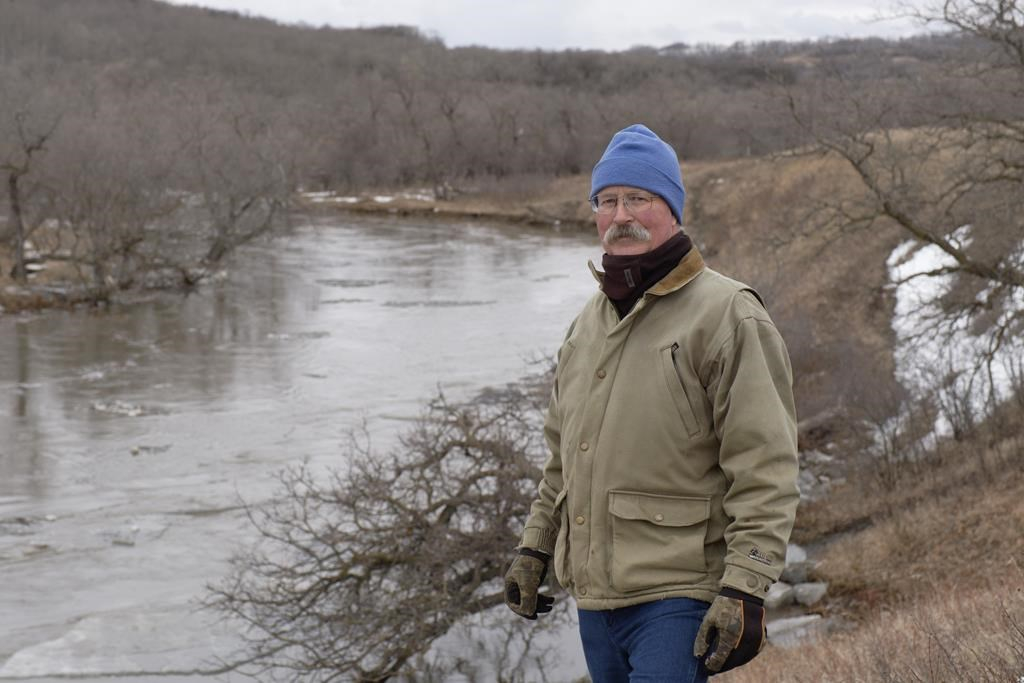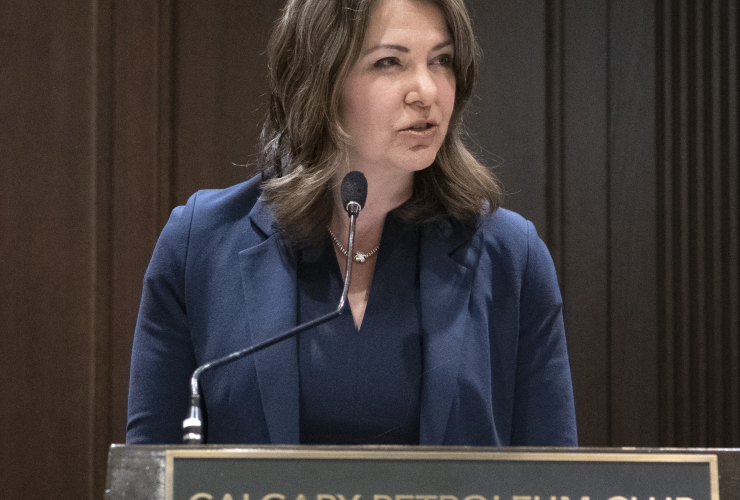Clint Blyth continues to see his stream banks erode each year.
The southeastern Saskatchewan rancher says the degradation is caused by those upstream who illegally drain water, as every year huge gushes take chunks out of the banks.
This year, it has forced him to move his fence line by about one metre.
“In a lot of places, (the stream banks) are twice as wide as they were in 2010,” Blyth told reporters Monday at Regina’s McKell Wascana Conservation Park, an area lush with grasses and wetlands.
“We don’t have stream banks that look like this,” he said, pointing to the park.
“(Ours) get saturated, then the water drops, then they cave in.”
Blyth joined representatives from various Saskatchewan environmental groups to raise concerns over a new drainage policy that they argue is not adequately protecting the province’s ecosystems.
The groups, which include the Saskatchewan Alliance for Water Sustainability, the Calling Lakes Ecomuseum and Last Mountain Stewardship Group, said the province's Agricultural Water Management Policy would allow farms to drain more wetlands and in effect put habitats, people and infrastructure at risk downstream.
The groups said losing more wetlands would also result in water quality to degrade, as there would be fewer of the areas to filter out contaminants.
Over time, as the climate changes, they said wetlands would become increasingly crucial to sustain communities, farms and industry.
“We support a growing Saskatchewan and we need wetlands in order to grow,” said Aura Lee MacPherson, chair of the Calling Lakes Ecomuseum.
Many farmers in Saskatchewan have been illegally draining water from wetlands over the years so they can grow more crops, helping them pay for land and increasingly expensive equipment.
The Water Security Agency is developing the policy and has said it’s working to bring unpermitted drainage into compliance.
The agency has indicated the policy would retain current drainage and allow further development if done responsibly. It’s also working on a strategy for wetlands that would ensure habitats are supported.
It did not immediately respond to a request for comment about the concerns.
Blyth said the agency hasn’t been enforcing the rules to stop people from draining.
He also said the agency has not done any work to slow down current drainage, resulting in continued erosion.
“We have an opportunity to fix and look after our wetlands, our streamflow and our water quality,” he said. “We’ve got to get past the short-sightedness of what we’re doing.”
MacPherson said Saskatchewan needs to develop a wetland policy that addresses people’s concerns while ensuring businesses aren’t affected.
“It would be making sure that what’s coming downstream is good water quality for everybody,” she said. “It would be creating neighbourliness and it would need regulation. It absolutely has to have regulation.”
Erika Ritchie, the Opposition NDP critic for the Water Security Agency, said the Saskatchewan Party government could look to Alberta and Manitoba for solutions in developing a wetland policy. The neighbouring provinces ensure protection for some wetlands.
Ritchie said the agency needs to be enforcing the rules so people aren’t illegally draining.
She also said the current approach of allowing drainage but in a slowed-down fashion is “not science-based.”
“They talked about creating larger wetlands, but they don’t function the same way. You may be having the same quantity of water in some cases, but they’re not part of the natural ecosystem in the same way in providing the same eco-services,” she said.
“I would like to see this government put partisanship aside and actually look at the science, listen to the experts … and put in a more balanced approach that’s going to take all these factors into consideration.”
This report by The Canadian Press was first published June 5, 2023.
It looks like things are
It looks like things are getting much worse in some states south of our border. Let's hope Canadians and our elected representatives place emphasis on protecting the environment.
Reference:
The US Supreme Court has gutted federal protection for wetlands — now what? Gardner RC, Nature 618 [215] 2023-06-05: doi: https://doi.org/10.1038/d41586-023-01827-y
It might be worth the farmer
It might be worth the farmer's while to plant shrubs and such right along the edge of the water, to maintain the structural integrity of the bank's soil. Grass grows only so deep, and the few trees seem to be of an age where they'd no longer have deep taproots to anchor them and the rest of their roots.
Something about this article
Something about this article raises the spectre of the dirty thirties and dust bowls. Just what are the politicians and burreaucrats in government thinking? Desertification is a feature, not a bug, of global warming. Do we really want to replicate the dust bowls? or the African drought diaspora?
Prior to the fad for Beaver hats, Canada was densely populated by Beaver ponds, sparkling blue eyes in lush landscapes.
Which picture is more appealing, more urgently essential - dust "ponds" or Beaver ponds?
Water retention. It stands
Water retention. It stands in the way of agricultural profit. Clear the land, drain it too, then farm. Like so many other industries they do not pay for these adverse externalities. Will it change without government regs. In Alberta and Saskatchewan , not a chance. Neoliberals strongly believe humans are here to manage the earth, and darned if those lefties will get in the way. So as more and more land gets cleared more and more gushes will erode and more and more silt make its way to Lake Winnipeg, silting up the fish habitat on the way
What always gets me is all
What always gets me is all these Christians who think the earth is for people to manage . . . but they don't want to manage it, they just want to grab what they can even if it wrecks the place. I do not comprehend how they can rationalize this slash-and-burn kind of approach as "stewardship". I'm not a Christian myself, but it's clear that the bible generally describes "stewardship" as this thing where, when the one you're stewarding for comes along, you give them something as good as or better than what they put in your care. I don't think their God would look kindly on people who, instead of stewarding the earth, created a wasteland and called it "profit".




Comments